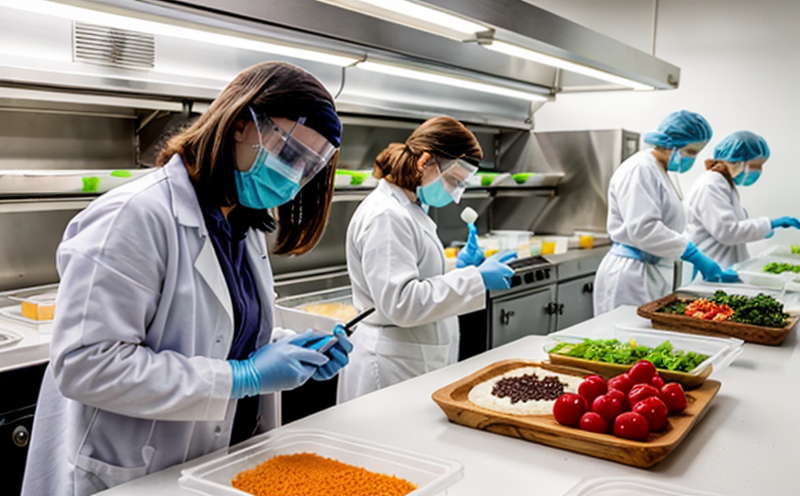EN 15705 Genotoxicity and Microbial Safety Testing in Food
The European Standard EN 15705 has been specifically designed to evaluate genotoxic and microbial safety aspects of food products. This service plays a critical role in ensuring the safety and quality of our food supply, aligning with global standards for food safety.
Genotoxicity testing assesses whether chemicals or substances are capable of causing genetic damage. Such damage can lead to mutations that may result in carcinogenic effects or other health risks. Microbial safety, on the other hand, ensures that microorganisms present in food do not pose a threat to human health. This comprehensive approach is vital for protecting consumers and maintaining public trust.
EN 15705 specifies methods for testing both genotoxicity and microbial load in foodstuffs. These tests are essential components of compliance with international standards such as ISO, ASTM, EN, IEC, etc., ensuring that the food products meet stringent safety requirements before they reach consumers.
The service involves a series of rigorous procedures including sample preparation, inoculation methods for microorganisms, and exposure to potential genotoxic agents. Once testing is complete, detailed reports are generated which outline all findings along with recommendations for further action if necessary. Our laboratory adheres strictly to these protocols ensuring accurate results every time.
Our experienced team of professionals employs state-of-the-art equipment calibrated according to international standards. This allows us to deliver precise and reliable data that can be trusted by industry stakeholders including quality managers, compliance officers, R&D engineers, and procurement personnel involved in food safety initiatives.
In addition to ensuring regulatory compliance, this service also contributes significantly towards environmental sustainability efforts by promoting safer practices throughout the entire supply chain. By identifying potential risks early on through thorough testing procedures outlined within EN 15705, we help reduce waste generation while improving resource efficiency across industries reliant upon safe and sustainable food production methods.
This expertise is crucial not only for maintaining high standards of hygiene but also in enhancing brand reputation among consumers who increasingly demand transparency regarding how their food choices affect both personal health and planetary well-being.
Why It Matters
The importance of genotoxicity and microbial safety testing cannot be overstated. Foodborne illnesses caused by harmful microorganisms can have severe consequences for public health, leading to hospitalizations and even fatalities if left unchecked. Similarly, exposure to genotoxins can lead to long-term health issues including cancer.
- Reduces the risk of foodborne illness outbreaks
- Promotes consumer confidence in product safety
- Aids manufacturers in meeting regulatory requirements
- Supports sustainable practices within the industry
- Maintains brand integrity and reputation
By adhering to EN 15705, we contribute directly to minimizing these risks. The results of our tests provide valuable insights into areas where improvements can be made, allowing for proactive measures that protect both consumers and producers alike.
In an increasingly interconnected world where global trade in food products is becoming more prevalent, ensuring consistent application of robust testing procedures becomes even more important. This helps maintain trust between countries and builds confidence among international customers regarding the safety of imported goods.
Environmental and Sustainability Contributions
Through our EN 15705 genotoxicity and microbial safety testing services, we make significant contributions to environmental sustainability. By identifying potential hazards early on during production processes, we enable companies to implement corrective actions that reduce waste generation.
- Promotes efficient use of resources by preventing contamination
- Encourages adoption of cleaner technologies in food processing
- Reduces the need for additional treatments or recalls due to safety concerns
- Fosters innovation towards safer and more sustainable food production methods
- Supports certification programs focused on eco-friendly practices
Beyond immediate benefits, our work helps pave the way for long-term environmental stewardship. By setting a high standard for what constitutes safe food products, we inspire others to follow suit, thereby fostering a culture of responsibility across all levels of industry.
Our commitment to sustainability aligns perfectly with broader goals set forth by organizations like the United Nations Environment Programme (UNEP). Together, we strive towards creating healthier ecosystems and more resilient communities both locally and globally.
Competitive Advantage and Market Impact
Adhering to EN 15705 provides significant competitive advantages for businesses operating within the food sector. Compliance with this standard demonstrates a company's dedication to maintaining top-notch quality standards, thereby enhancing its reputation among customers.
Achieving certification through EN 15705 can significantly impact market perception positively by showcasing a commitment to safety and regulatory compliance. This can lead to increased sales and better relationships with suppliers and distributors who prioritize ethical business practices.
Our laboratory's expertise in this area allows us to offer customized solutions tailored specifically to each client’s needs, whether they require basic testing or comprehensive audits covering all aspects of their operations.
In addition, our services contribute directly towards reducing operational costs associated with potential recalls or lawsuits resulting from unsafe products. By catching issues early on during the development stage, clients can avoid costly delays and disruptions in production schedules.
Furthermore, compliance with international standards like EN 15705 opens up opportunities for export markets where stringent safety regulations are enforced. This enables businesses to expand their reach beyond national borders into new territories without compromising on quality or safety standards.





